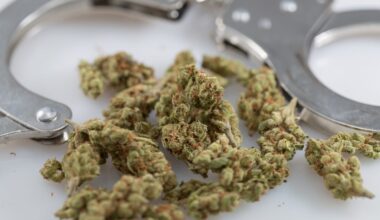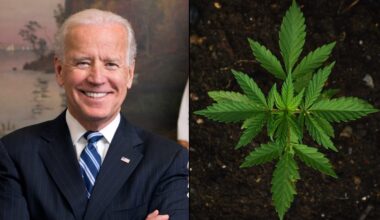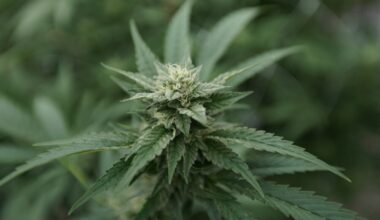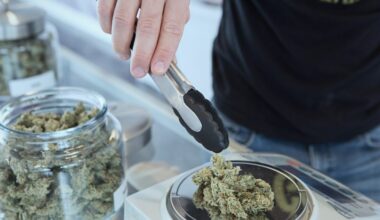A first-of-its-kind taxpayer-funded marijuana PSA aired in most of New York during an NBA Finals game on Thursday, boldly addressing the racially discriminatory harms of cannabis criminalization and highlighting steps that state regulators are taking to right the wrongs of prohibition.
However, one major TV station refused to air the spot.
The Office of Cannabis Management (OCM) has been rolling out marijuana PSAs in the lead up to the launch of the state’s retail market, but this one was unique in its political focus, which is made all the more significant because it aired on nearly every local ABC affiliate in the state during Game 1 of the national basketball championship finals.
“Latino New Yorkers were eight times more likely to be arrested for cannabis than white New Yorkers over the past 30 years. Black New Yorkers? 15 times more likely,” the narrator says in the ad.
WATCH: Our newest ad drops during Game 1 of the NBA Finals tonight.
It highlights how decades of cannabis overpolicing harmed Black and Latino New Yorkers, and the work we’re doing to begin to address these devastating wrongs. pic.twitter.com/FK0ZJ6HMOR
— NYS Office of Cannabis Management (@nys_cannabis) June 2, 2022
“White, Black or Brown: Data shows we all use cannabis at the same rate. Now New York has changed course and legalized cannabis for adults 21 and over,” it continues. “We are building an equitable industry that invests in communities.”
The ad is the final piece of a “Cannabis Conversations” series that’s meant to promote public education around the state’s emerging marijuana market, with other PSAs focusing on issues such as preventing impaired driving, the rules around public consumption and safe storage of cannabis to prevent youth access.
“There’s so much education that needs to occur,” OCM Executive Director Chris Alexander told Marijuana Moment in a phone interview on Friday. “There are assumptions. There’s stigma related to the plant. There are assumptions about government—there are assumptions about the commitment, even, that we have here.”
“So we thought the ad was important, as is in line with the rest of the Cannabis Conversation series, providing that base level education to the viewer who’s not as engaged as we are on the developments in the space,” he said. “While we’re also telling folks that they should keep their cannabis stored away, we think it’s also important for them to understand that we, as a state, are also recognizing the harms of previous policies and are taking significant steps to correct them.”
“It’s doubling down. It’s letting folks know that the investment and the commitment is real, and then hoping that they come back and tap in for more information and they tune in with our office,” Alexander said. “We think it was important to start with this type of message to take on the issue head-on.”
Notably, the equity-centric ad did not air on one key affiliate station that reaches New York City audiences, WABC-TV. A spokesperson for OCM said that regulators have yet to receive an answer from the station as to why it chose not to promote it. Marijuana Moment reached out to WABC for comment, but representatives did not respond by the time of publication.
Alexander emphasized that “it’s part of our mandate and our law that we run this broad, overreaching public education campaign” and “we’re continuously trying to push media partners to get some additional exposure.”
“An understanding of our past—even when it is difficult—helps direct the way forward and the public service advertisement we’re debuting today during the NBA Finals speaks to that,” Tremaine Wright, chair of the Cannabis Control Board (CCB) which provides oversight of OCM, said in a press release.
“Through this advertisement, we will shine a light on the disparity in enforcement and arrests that harmed Black and Brown communities across New York,” Wright said. “We’re the raising awareness of New Yorkers around this critical issue and educating them on the Cannabis Law’s mandate that we prioritize the work to address those harms and invest in revitalizing our hardest hit communities.”
Melissa Moore, director of civil systems reform for the Drug Policy Alliance, said that “advancing accountability for the decades-long racist marijuana arrest crusade in New York puts another nail in the coffin of the war on drugs that has devastated so many communities across the state.”
CCB also wants the opportunity to showcase its marijuana PSA campaign on the social media app TikTok, but it was told by the company previously that it could not use the platform because of its existing ban on the use of the word “cannabis.” The department recently sent a letter to TikTok, requesting a policy change for government marijuana-related ads that concern public education.
Meanwhile, regulators have been hard at work finalizing regulations for the adult-use marijuana market that’s expected to launch with retail sales later this year—a timeline that Alexander affirmed on Friday in the interview with Marijuana Moment.
On Wednesday, for example, CCB approved a series of proposed rules for packaging, labeling, advertising and testing requirements. There’s now a public comment period to weigh in on the proposed rules.
They also approved 16 additional recreational cannabis cultivator applications to help ensure the market has enough product when sales start, raising the total to 162.
Gov. Kathy Hochul (D) signed a bill from Assembly Majority Leader Crystal Peoples-Stokes (D) and Sen. Michelle Hinchey (D) to create conditional licenses in February. The intent is to allow existing hemp operators to get a head start on growing marijuana to meet demand for the forthcoming industry.
Regulators also advanced a rule in March to make it so people with prior marijuana convictions, or whose family members have been harmed by criminalization, will get the first round of adult-use marijuana retailer licenses—ahead of existing medical cannabis businesses. A recent poll found that most New Yorkers voters are against that proposal.
During April’s CCB meeting, regulators also approved revised regulations to allow medical marijuana patients to grow their own plants for personal use following a public comment period on initial rules that were proposed last year.
In general, the rule would allow registered patients and caregivers to grow up to six plants, only three of which could be mature. They could possess up to five pounds of cannabis derived from those plants, which is consistent with the state’s adult-use legalization law.
Meanwhile, New York lawmakers recently sent a budget proposal to the governor’s desk that includes provisions to let marijuana businesses take state tax deductions that are available to other industries despite an ongoing federal ban on cannabis. That was signed into law.
Sen. Jeremy Cooney (D) filed a standalone bill in December seeking a similar carve-out for the state’s burgeoning cannabis market. Assemblymember Donna Lupardo (D) followed suit in her chamber. Cooney also filed a bill last month to allow regulators to disclose certain information about cannabis licensees to financial institutions to promote marijuana banking.
—
Marijuana Moment is already tracking more than 1,000 cannabis, psychedelics and drug policy bills in state legislatures and Congress this year. Patreon supporters pledging at least $25/month get access to our interactive maps, charts and hearing calendar so they don’t miss any developments.![]()
Learn more about our marijuana bill tracker and become a supporter on Patreon to get access.
—
As it stands, adults 21 and older can possess and publicly consume cannabis, as well as gift marijuana to other adults as long as they aren’t being compensated. But regulators are still finalizing licensing rules, and there are currently no retailers that are authorized to sell cannabis for adult use in the state.
Hochul has repeatedly emphasized her interest in efficiently implementing the legalization law.
The governor released a State of the State book in January that called for the creation of a $200 million public-private fund to specifically help promote social equity in the state’s burgeoning marijuana market.
That proposal was also cited in the governor’s executive budget, which was released in January. The budget also estimated that New York stands to generate more than $1.25 billion in marijuana tax revenue over the next six years.
Hochul said that while cannabis business licenses have yet to be approved since legalization was signed into law last year, the market stands to generate billions of dollars, and it’s important to “create opportunities for all New Yorkers, particularly those from historically marginalized communities.”
Enacting legislation that expedites licensing could help the state reduce the number of businesses that are effectively using the legal “gifting” provision of the state’s marijuana law to give away cannabis for “free” if a non-marijuana-related purchase is made.
New York regulators recently issued warnings to more than two dozen businesses that they allege are either illegally selling marijuana without a license or exploiting the “gifting” component.
CCB’s Wright talked about the complicated legal landscape that’s developed in New York as the state moves from prohibition to legalization at a community board event in April.
She stressed that New York’s marijuana law was specifically crafted with those most impacted by criminalization in mind, and so regulators are working to ensure that people who engaged in previously illegal activities and were caught up in the war on cannabis have a seat at the table in the new industry.
Here are some other ways that New York lawmakers and regulators are working to promote drug policy reform as the state prepares to implement retail marijuana sales:
The New York Senate approved a bill on Wednesday that would require public health insurance programs to cover medical marijuana expenses and clarify that private insurers are allowed to do the same.
The state Department of Labor separately announced in recent guidance that New York employers are no longer allowed to drug test most workers for marijuana.
Meanwhile, a New York lawmaker introduced a bill in June that would require the state to establish an institute to research the therapeutic potential of psychedelics.
Another state legislator filed legislation in December to legalize psilocybin mushrooms for medical purposes and establish facilities where the psychedelic could be grown and administered to patients.
Separately, the mayor of New York City says he’s looking into the idea of authorizing marijuana to be grown in greenhouses on the rooftops of public housing buildings—an ambitious proposal that’s unlikely to sit well with the federal government, which provides funding to support the NYC Housing Authority (NYCHA).
California Awards $35.5 Million In Marijuana Tax-Funded Grants To Repair Harms Of War On Drugs
Photo courtesy of Max Pixel.
Medical Disclaimer:
The information provided in these blog posts is intended for general informational and educational purposes only. It is not a substitute for professional medical advice, diagnosis, or treatment. Always seek the advice of your physician or other qualified healthcare provider with any questions you may have regarding a medical condition. The use of any information provided in these blog posts is solely at your own risk. The authors and the website do not recommend or endorse any specific products, treatments, or procedures mentioned. Reliance on any information in these blog posts is solely at your own discretion.






